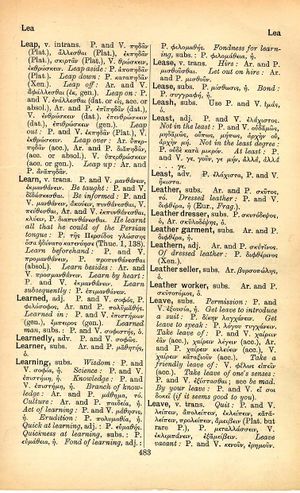leave: Difference between revisions
τὸ γὰρ εὖ πράττειν παρὰ τὴν ἀξίαν ἀφορμὴ τοῦ κακῶς φρονεῖν τοῖς ἀνοήτοις γίγνεται → undeserved success engenders folly in unbalanced minds
(Woodhouse 3) |
(CSV4) |
||
| Line 1: | Line 1: | ||
{{ | {{Woodhouse1 | ||
| | |Text=[[File:woodhouse_483.jpg|thumb|link={{filepath:woodhouse_483.jpg}}]]'''subs.''' | ||
<b class="b2">Permission</b>: P. and V. [[ἐξουσία]], ἡ. | |||
<b class="b2">Get leave to introduce a suit</b>: P. δίκην λαγχάνειν. | |||
<b class="b2">Get leave to speak</b>: P. λόγου τυγχάνειν. | |||
<b class="b2">Take leave of</b>: P. and V. [[χαίρω|χαίρειν]] ἐᾶν (acc.), [[χαίρω|χαίρειν]] [[λέγω|λέγειν]] (acc.), Ar. and P. [[χαίρω|χαίρειν]] κελεύειν (acc.), V. [[χαίρω|χαίρειν]] καταξιοῦν (acc.). | |||
<b class="b2">Take a friendly leave of</b>: V. φίλως εἰπεῖν (acc.). | |||
<b class="b2">Take leave of one's senses</b>: P. and V. ἐξίστασθαι; see [[be mad]]. | |||
<b class="b2">By your leave</b>: P. and V. εἴ σοι δοκεῖ (<b class="b2">if it seems good to you</b>). | |||
'''v. trans.''' | |||
<b class="b2">Quit</b>: P. and V. [[λείπω|[[λείπω|λείπειν]], [[ἀπολείπω|ἀπολείπειν]], [[ἐκλείπω|ἐκλείπειν]], [[καταλείπω|καταλείπειν]], [[προλείπω|προλείπειν]], ἀμείβειν (Plat. but rare P.), P. μεταλλάσσειν, V. ἐκλιμπάνειν, ἐξαμείβειν. | |||
<b class="b2">Leave vacant</b>: P. and V. κενοῦν, ἐρημοῦν. | |||
<b class="b2">You have left no hope among us</b>: V. οὐδʼ ἐλλέλοιπας ἐλπίδα (Eur., ''El.'' 609). | |||
<b class="b2">Bequeath</b>: Ar. and P. [[καταλείπω|καταλείπειν]], V. [[λείπω|[[λείπω|λείπειν]] (Eur., ''Alc.'' 688). | |||
<b class="b2">Leave alone, let be</b>: P. and V. ἐᾶν. | |||
<b class="b2">Leave behind</b>: Ar. <b class="b2">and B.</b> ὑπολείπειν. | |||
<b class="b2">Be left behind</b> (<b class="b2">in a contest</b>): P. and V. λείπεσθαι, V. ἐλλείπεσθαι, Ar. and P. ὑπολείπεσθαι. | |||
<b class="b2">Leave for decision</b>: see [[leave to]]. | |||
<b class="b2">Leave go of</b>: P. and V. μεθιέναι (acc.), ἀφιέναι (acc.), ἀφίεσθαι (gen.), Ar. and V. μεθίεσθαι (gen.). | |||
<b class="b2">Leave in</b> (<b class="b2">a place</b>): P. ἐγκαταλείπειν (absol.). | |||
<b class="b2">Leave in the lurch</b>: P. and V. [[λείπω|[[λείπω|λείπειν]], [[καταλείπω|καταλείπειν]], [[προλείπω|προλείπειν]], προδιδόναι, ἐρημοῦν, Ar. and P. προϊέναι (or mid.). | |||
<b class="b2">Leave off</b>: v. trans., P. and V. μεθιέναι; v. intrans., see [[cease]]. | |||
<b class="b2">Leave out</b>: P. and V. παραλείπειν (Eur., ''Hel.'' 773), παριέναι, [[ἐκλείπω|ἐκλείπειν]], ἐλλείπειν. | |||
<b class="b2">Be left over</b>: Ar. and V. περιλείπεσθαι; see [[remain]]. | |||
<b class="b2">Leave to</b> (for [[decision]], etc.): Ar. and P. [[ἐπιτρέπω|ἐπιτρέπειν]] (τί τινι), V. παριέναι (τί τινι); see [[refer]]. | |||
}} | }} | ||
Revision as of 09:45, 21 July 2017
{{Woodhouse1
|Text=
subs.
Permission: P. and V. ἐξουσία, ἡ. Get leave to introduce a suit: P. δίκην λαγχάνειν. Get leave to speak: P. λόγου τυγχάνειν. Take leave of: P. and V. χαίρειν ἐᾶν (acc.), χαίρειν λέγειν (acc.), Ar. and P. χαίρειν κελεύειν (acc.), V. χαίρειν καταξιοῦν (acc.). Take a friendly leave of: V. φίλως εἰπεῖν (acc.). Take leave of one's senses: P. and V. ἐξίστασθαι; see be mad. By your leave: P. and V. εἴ σοι δοκεῖ (if it seems good to you). v. trans. Quit: P. and V. [[λείπω|λείπειν, ἀπολείπειν, ἐκλείπειν, καταλείπειν, προλείπειν, ἀμείβειν (Plat. but rare P.), P. μεταλλάσσειν, V. ἐκλιμπάνειν, ἐξαμείβειν. Leave vacant: P. and V. κενοῦν, ἐρημοῦν. You have left no hope among us: V. οὐδʼ ἐλλέλοιπας ἐλπίδα (Eur., El. 609). Bequeath: Ar. and P. καταλείπειν, V. [[λείπω|λείπειν (Eur., Alc. 688). Leave alone, let be: P. and V. ἐᾶν. Leave behind: Ar. and B. ὑπολείπειν. Be left behind (in a contest): P. and V. λείπεσθαι, V. ἐλλείπεσθαι, Ar. and P. ὑπολείπεσθαι. Leave for decision: see leave to. Leave go of: P. and V. μεθιέναι (acc.), ἀφιέναι (acc.), ἀφίεσθαι (gen.), Ar. and V. μεθίεσθαι (gen.). Leave in (a place): P. ἐγκαταλείπειν (absol.). Leave in the lurch: P. and V. [[λείπω|λείπειν, καταλείπειν, προλείπειν, προδιδόναι, ἐρημοῦν, Ar. and P. προϊέναι (or mid.). Leave off: v. trans., P. and V. μεθιέναι; v. intrans., see cease. Leave out: P. and V. παραλείπειν (Eur., Hel. 773), παριέναι, ἐκλείπειν, ἐλλείπειν. Be left over: Ar. and V. περιλείπεσθαι; see remain. Leave to (for decision, etc.): Ar. and P. ἐπιτρέπειν (τί τινι), V. παριέναι (τί τινι); see refer. }}

